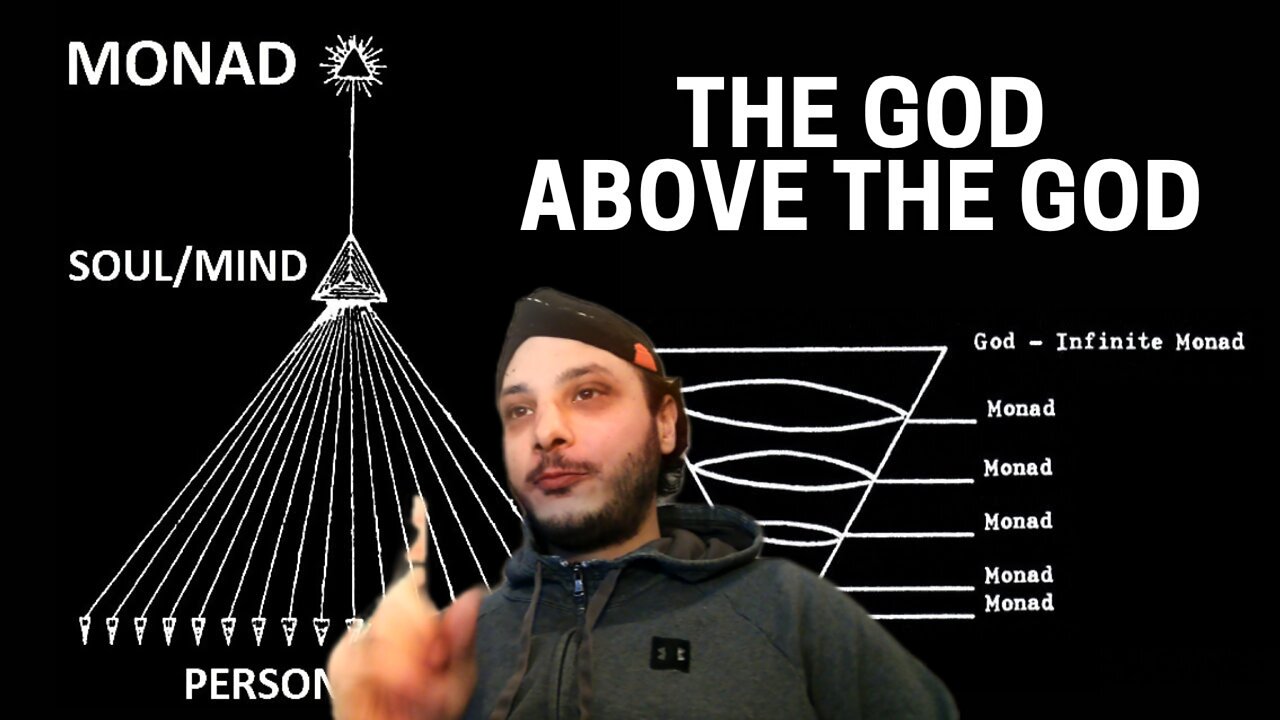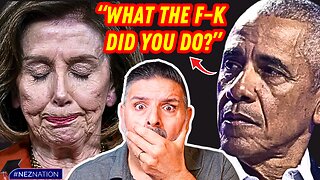Premium Only Content

God's name - part 1
God's name will be a multi part series exploring the origins and the true name of God , where names like y.h.w.h. come from , and we will try to uncover the hidden God , hidden from us by an ancient covenant ,my name is Omar Samson and we will free humanity , together , yes we can , make earth great again,free the holy land , free Palestine God
### 1. **Gnostic Texts and the Demiurge Concept**
In **Gnostic Christianity** (2nd–4th centuries CE), YHWH (the Old Testament God) was sometimes identified with the **Demiurge** — a lower, ignorant, or even malevolent being who *creates the material world* but is **not the true supreme God**.
* The **Apocryphon of John**, **Hypostasis of the Archons**, and **On the Origin of the World** (found in the Nag Hammadi library) describe the Demiurge as a being named **Yaldabaoth**, who arrogantly declares, *“I am God, and there is no other beside me.”*
* Gnostics took this line (from Isaiah 45:5 and Exodus 20:3) as proof that the Demiurge was a **false god** claiming supremacy.
* In these texts, **Sophia (Wisdom)** emanates from the higher divine realm, and her error produces the Demiurge — who then traps souls in matter.
---
### 2. **Moral and Character Contrast: Old vs. New Testament**
Many Gnostics and later philosophers pointed to the **ethical difference** between:
* **YHWH**, who commands wars, punishments, and strict laws (seen as harsh or jealous), and
* The **God revealed by Jesus**, who emphasizes forgiveness, mercy, and universal love.
Thinkers such as **Marcion of Sinope (2nd century CE)** argued that these could not be the same deity.
He taught that the **Creator God (of the Old Testament)** was just but cruel, while the **Father of Jesus** was purely good and loving.
Marcion even compiled one of the earliest Christian canons — omitting the Old Testament entirely.
---
### 3. **Philosophical Influence from Plato**
The idea of a **Demiurge** comes from **Plato’s *Timaeus*** (4th century BCE).
In that text, the Demiurge is not evil — merely the *craftsman* who forms the material world.
However, later Gnostics reinterpreted this idea to fit their theology:
they saw **matter** as corrupt and imperfect, and therefore the **creator of matter** must be ignorant or evil.
---
### 4. **Gnostic Symbolism and Dualism**
Gnosticism is dualistic: **Spirit = good**, **Matter = evil**.
The Demiurge, as maker of the material realm, is the **antagonist of spiritual liberation**.
Jesus, in this interpretation, comes from the higher, true God to **free humanity** from the Demiurge’s control.
This cosmic struggle is described symbolically in texts like *The Gospel of Thomas* and *The Gospel of Judas*.
---
### 5. **Esoteric Interpretations**
Some later mystical and occult systems (e.g., Kabbalistic or Hermetic reinterpretations) also explore this tension:
* **YHWH** is sometimes seen as a *partial revelation* or a *lower emanation* rather than the Absolute Source.
* Others associate the **God of the Old Testament** with a being guarding knowledge or controlling humanity’s spiritual ascent.
---
### 6. **Summary of the Core Argument**
| Aspect | Old Testament YHWH (Demiurge in Gnosticism) | New Testament God (True Source) |
| ---------- | -------------------------------------------- | ------------------------------------- |
| Nature | Creator of material world, jealous, punitive | Transcendent, loving, merciful |
| Domain | Physical cosmos | Spiritual pleroma (fullness of light) |
| Goal | Maintain control over creation | Liberate souls from ignorance |
| Key phrase | “I am a jealous God” | “God is love” |
---
Would you like me to provide **direct excerpts** from the Nag Hammadi texts (e.g., *Apocryphon of John*) that show where YHWH is equated with the Demiurge, or a **comparison chart** of Old vs. New Testament passages used by Marcion and Gnostics to support this view?
---
## 🕎 1. Gnostic Identification of YHWH with the Demiurge
### 📜 *The Apocryphon of John* (Nag Hammadi Codex II, 1)
This foundational Gnostic text describes the origin of the Demiurge (“Yaldabaoth”) and how he claims divine authority:
> “And he said, ‘I am God, and there is no other beside me.’
> When he said this, he sinned against the Entirety.
> And this boast rose up to incorruptibility, and a voice came forth from above the realm of absolute power, saying,
> ‘You are mistaken, Samael’ — which means ‘blind god.’”
* **Interpretation:**
Gnostics read this as an allusion to **Isaiah 45:5** (“I am the Lord, and there is no other; apart from me there is no God”).
They concluded that the Old Testament deity was *not the supreme being*, but an ignorant lower creator mistaking himself for the ultimate source.
---
### 📜 *Hypostasis of the Archons* (The Reality of the Rulers)
> “Their chief is blind; because of his power and his ignorance and his arrogance he said, ‘It is I who am God; there is none apart from me.’
> When he said this, he sinned against the Entirety.”
* Again, this mirrors the prophetic formula in the Hebrew Bible.
The Gnostics took such statements not as divine truth but as **evidence of the Demiurge’s delusion** — the mark of a being who creates a flawed world out of ignorance.
---
### 📜 *On the Origin of the World*
> “Yaldabaoth said to his offspring, ‘I am God of the whole world.’
> But they did not obey him.
> For he was ignorant of the place from which his own strength had come.”
* This text presents the Demiurge as powerful but **ignorant of his higher origin** (Sophia, the divine wisdom who emanated him).
He becomes the ruler of a **false material cosmos**.
---
## ✝️ 2. Marcion’s Contradiction Between the Two Gods
**Marcion of Sinope (c. 85–160 CE)** developed the earliest systematic argument that:
* The **God of the Old Testament** (the creator, *demiurgos*) is *just but harsh*, the author of Law, war, and punishment.
* The **God of Jesus** is *good, merciful, and unknown* to the world until Christ’s revelation.
He summarized this contrast roughly as follows (according to *Tertullian, Against Marcion* 1.11–1.19):
| Old Testament (YHWH) | New Testament (Father of Jesus) |
| ----------------------------------- | --------------------------------------- |
| “An eye for an eye.” (Exodus 21:24) | “Turn the other cheek.” (Matthew 5:39) |
| “I create evil.” (Isaiah 45:7) | “Deliver us from evil.” (Matthew 6:13) |
| “I am a jealous God.” (Exodus 20:5) | “God is love.” (1 John 4:8) |
| Commands genocide (Joshua 6–10) | Commands love of enemies (Matthew 5:44) |
| Rewards and punishes by law | Saves through grace and forgiveness |
* Marcion concluded: **two separate deities** — one the **Creator and Judge**, the other the **Redeemer and Father**.
---
## 🔮 3. Philosophical and Esoteric Context
### Plato’s *Timaeus*
* Describes a **Demiurge** as a *craftsman* who shapes the cosmos out of chaos.
* Not evil, but **not the supreme source either**.
* Gnostics **absorbed and radicalized** this idea: the material world itself became a *prison*, not a harmony.
### Sophia and the Fall
* In Gnostic cosmology, **Sophia** (divine Wisdom) acts without her partner and produces Yaldabaoth.
* Out of shame and ignorance, Yaldabaoth creates the material world — effectively *trapping divine sparks (souls)* in matter.
* Jesus, in this view, comes from the **Pleroma (Fullness)** to *awaken the trapped souls* and show them the true, unknowable Father beyond YHWH.
---
## 🪶 4. Summary Table — Gnostic & Marcionite Parallels
| Concept | YHWH / Demiurge | True God / Father of Jesus |
| ------------------------ | --------------------------------- | --------------------------- |
| Realm | Material world (Kosmos) | Pleroma (Fullness of Light) |
| Nature | Ignorant, jealous, just but cruel | Unknown, loving, merciful |
| Key quality | Power and Law | Grace and Love |
| Relationship to humanity | Creates and enslaves | Redeems and liberates |
| Representative | Archons, prophets of the Law | Christ, revealer of truth |
---
## 📚 5. Recommended Sources for Further Reading
1. **The Nag Hammadi Scriptures**, ed. Marvin Meyer — includes *Apocryphon of John*, *Hypostasis of the Archons*, etc.
2. **The Gnostic Bible**, ed. Willis Barnstone & Marvin Meyer — excellent commentary on Yaldabaoth and Sophia myths.
3. **Tertullian, *Against Marcion*** — a detailed rebuttal that preserves much of Marcion’s teaching.
4. **Hans Jonas, *The Gnostic Religion*** — modern analysis of the Demiurge and dualism in early Christian thought.
5. **Elaine Pagels, *The Gnostic Gospels*** — accessible overview of how early Christianity split over these cosmological views.
, name , scripture , tanakh , bible , Babylon , Egypt , christian , jew , muslim , hindoe , Buddhist , theology , philosophy , cosmology , Gnostic , academic , archaeological , historic , spiritual , physic , duality , Sophia , yaldeboath , matrix , archons , annunaki , angels , demons , Jesus (pbuh), omar samson , free humanity
-
 2:01:36
2:01:36
Free Humanity
16 hours agoThe Meditative grace of nuns singing Gregorian chants
37 -
 28:53
28:53
iCkEdMeL
14 hours agoBREAKING: 9 DEAD After UPS Plane BURSTS Into Fireball at Louisville Airport
16.6K5 -
 20:52
20:52
Professor Nez
17 hours agoThe TRUTH is Actually WORSE than we Thought...
1.69K14 -
 8:59
8:59
MattMorseTV
16 hours ago $0.03 earnedTrump’s DIRE WARNING to the Senate GOP.
65.6K79 -
 2:13:33
2:13:33
Side Scrollers Podcast
18 hours agoAsmongold SUED for Emotional Distress + Hasan REJECTED+ INSANE Plane Crash + More | Side Scrollers
81K22 -
 21:39
21:39
Nikko Ortiz
4 days agoI Take A North Korean Shooting
74.2K10 -
 23:01
23:01
GritsGG
16 hours agoWarzone Solo Dubular! Last Night Time Solo???
7.81K -
 22:47
22:47
The Pascal Show
13 hours agoTHEY’RE HIDING EVIDENCE?! Candace Owens EXPOSES Foreign Connection In Charlie Kirk Shooting
16.3K22 -
 LIVE
LIVE
Lofi Girl
3 years agolofi hip hop radio 📚 - beats to relax/study to
223 watching -

FreshandFit
13 hours agoLas Vegas Takeover!
192K18